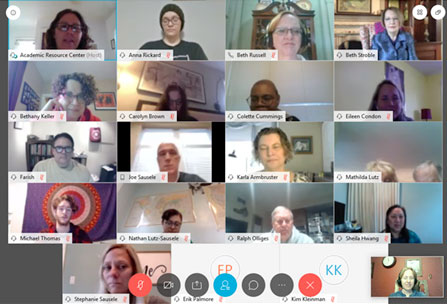Virtual Ceremony Recognizes Freshman Writing Award Student Winners
April 21, 2020

The Freshman Writing Award celebrates academic excellence in writing. It honors two students – a first place winner and a second place winner – each spring. This year’s ceremony took place Friday, April 17, via WebEx.
Chancellor Elizabeth (Beth) J. Stroble presented the awards after opening comments by Kristin Cobos, Writing and Online Writing Center coordinator in the Academic Resource Center (ARC). In her speech, Chancellor Stroble recounted the impact writing had throughout her childhood and highlighted the importance of writing in our academic and personal lives.
This year’s first place winner, Nathaniel Lutz-Sausele, was recognized for his essay, “Whitman’s Fulfillment of Emerson’s ‘Poet’ Prophecy,” which he completed for Dr. Karla Armbruster’s U.S. Literature course (ENGL 2050). Lutz-Sausele received a $125 educational grant.
The second place winner, Gabby Buchholz, was recognized for her essay, “Unique Femininity in Shakespeare’s Twelfth Night,” which she wrote for Anne McIlhaney’s Seminar in Literary Analysis course (ENGL 1900). Buchholz received a $75 educational grant.
The virtual ceremony included closing comments by Erica Ellard, director of the Academic Resource Center, and congratulatory comments from Armbruster and other attendees.
About the Freshman Writing Award
To be eligible for the Freshman Writing Award, students must have been freshmen during the applicable Fall semester preceding the award and must have written their nominated work for a Webster course during the applicable Fall semester. Beyond those details, there are no limitations on the types of written works that may be submitted for the award.
“What makes the Freshman Writing Award special is the diversity of writing styles and genres seen in the submissions. We want to celebrate the talent and uniqueness of Freshman writers,” says Cobos.
Typically, faculty who teach freshmen in Fall semesters nominate students and their written works for the award. However, students may also self-nominate in a process that runs from mid-December to mid-February.
At the close of the nomination period, a judging committee, comprised of faculty, staff, and peer writing coaches, reviews the nominations and selects the two winners. The judging criteria includes effectiveness, clarity, and purpose of writing. These winners are recognized in a ceremony in mid-April of each year.
